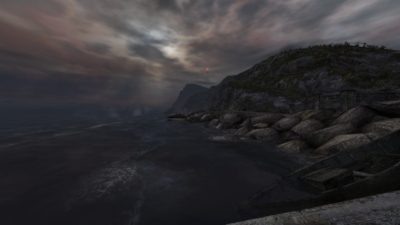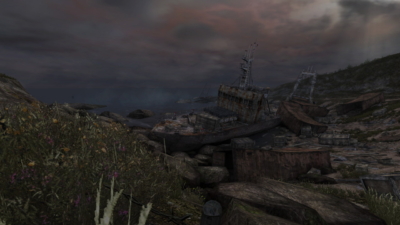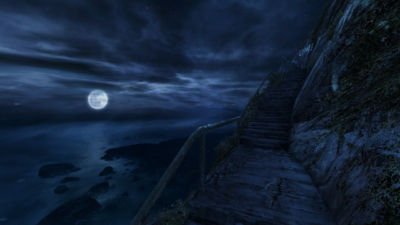Hello! We are back, just as Christmas this year is cancelled, for those of us in the UK. (Probably for the best though, I guess).
Today we have another discussion of a modern indie adventure game, with significant spoilers. It’s part of an ongoing series that we’ve chosen to unimaginatively, and belatedly, call: Discussion: [indie game] (spoilers!)
Hopefully that admittedly quite clumsy title does at least tell you what’s involved, or enough for you to know that it’s best not to read ahead without playing the game under discussion first, unless you have absolutely no intention of ever doing so.
Today’s game is Dear Esther, which started life as a mod for Half-Life 2 in 2008, but was later completely redeveloped as a stand alone title and released commercially in 2012. (We played the Landmark Edition, which moved everything to the Unity engine from Source, and comes with optional commentary from the developers). It’s considered by many to be the original ‘walking simulator’ and as we’ve covered a few of those in this series, it seemed an obvious one to cover at some point.
Like many of these games, to say too much even at this stage risks potentially spoiling things, but Dear Esther is set on an island in the Hebrides, and the game involves exploring that island while listening to the words of an unnamed man, our narrator. Each passage of audio begins with the game’s title, and it might at first be assumed that the narrator is reading letters that are addressed to his wife. However, as we shall see, many things in this game soon become a matter of interpretation.
Here’s a short trailer:
Hmm…what do you make of that, then? Well to find out, you could always play the game.
Otherwise, as always, here’s our ***final spoiler warning*** for the discussion ahead.
Jazz Poetry and Yoghurt
Rik: So, do we remember who picked this one, and why?
Jo: I think we narrowed it down to three choices, and then we just plumped for Dear Esther… (actually, I think I plumped for it.)
Rik: I talked previously about having the various ‘walking simulators’ mixed up in my head. I had thought Gone Home was the first one of its type in the modern era. I had heard of Dear Esther, but hadn’t realised it was older than GH. Or was generally considered the first of its type in the modern era.
Jo: No, me neither.
Rik: So, seeing as we have covered a lot of those types of games so far, I figured it might be good to go back to this one.
Jo: I only stumbled upon it after looking for more games like Gone Home, and this one kept cropping up.
Rik: Did you know much about it?
Jo: No, nothing really. How about you?
Rik: I knew it was on an island, and might be vaguely mopey. But that was about it. I ended up being surprised that it was actually fairly different from what I expected, even though it is still clearly within the same genre.
Jo: Yeah, I didn’t know what to expect — although I thought it would be similar to most of the other games we’ve played so far, but it wasn’t, and that was a bit of a surprise.
Rik: You still walk around and don’t do much else.
Jo: Which would make sense, as this paved the way for the games that followed. But it’s *literally* just walking around.
Rik: That was what surprised me a bit. Picking things up isn’t possible and even looking at them isn’t that important. The purest interpretation of the phrase ‘walking simulator’.
Jo: Yeah, exactly. Having played this one, I can see where the term came from, even though I still don’t really think it’s applicable to the other games we’ve covered.
Rik: How soon after you started did you realise it might be a bit different from what you expected? (For me, it was about 5 seconds…)
Jo: Yeah, I was going to say it was pretty immediate. The first thing I did was walk into a shed and try to pick something up, realised I couldn’t do it, and then had the ‘I hope it isn’t like this all the way through’ thought.
Rik: I have to say it was even with the first monologue that it hit me. The poetic/arty style of it all made me think, crikey, am I going to have to concentrate a bit more than usual here?
Jo: I didn’t understand the first monologue. My brain didn’t process it at all. So I had that same feeling of ‘right, better focus up here’ so that’s when I went into the shed, looking for clues.
Rik: Also, while fannying around with the settings at the beginning and restarting, I was confused why the opening monologue wasn’t the same each time.
Jo: Is it not?
Rik: There are random elements each time you play.
Jo: I played it twice, and I didn’t get that… oops!
Rik: As I understand it, that’s to give players a different experience from each other, and is not meant to lead to obsessive replaying to ‘100%’ it. Although gamers being gamers (and it being a short game) that is what has happened. But at the outset, I was equally prepared to accept at the start that I’d just misheard the first time.
Jo: While I didn’t really grasp that first monologue, I immediately associated the voice with Howard Moon from The Mighty Boosh. And once made, that connection was very hard to shake.
Rik: So you found the speeches unintentionally funny?
Jo: Er…yes.
Rik: I was trying to think if it might be someone famous, I had a note: ‘Colin Firth?!’ in my pad. Who obviously wouldn’t lend his name to an indie game based on a Half-Life 2 mod.
Jo: All my mind could think about was Howard Moon in a pork pie hat reciting jazz poetry.
Rik: Let’s Jazzercize!
Jo: Hahaha! During that first part, I was still holding out a bit of hope. I wondered if maybe it was just an ‘intro’.
Rik: I still thought, ok, we are still going to find out what has happened here. What has happened to this big boat here, and what is the significance of the yoghurt?
Jo: YES! Yoghurt!
Rik: ‘A large quantity of antacid yoghurt, bound for the European market.’
Jo: What the heck was that about?!
Rik: I was still in computer game mode, thinking there’s a puzzle to be solved here. Trying to work out what happened.
Jo: I think the yoghurt point was where something shifted in my head, and I was like ‘Oh. I’m not going to understand this, am I?’
Rik: I took at face value all the stuff about Donnelly and Jakobson, etc. And was trying to place it, logically. Had this man [the narrator] met Donnelly, or he read about him in a book? Or was he Donnelly?
Jo: I wondered if he was Donnelly at one stage, and maybe was referring to himself in the third person.
Rik: Well this is the thing really. The characters all become mixed up. At first it seems Paul is the obvious antagonist, mentioned in relation to the drink-driving accident [that killed the eponymous Esther]. But later, Donnelly and Jakobsen are also mixed up in this too.
Jo: At first, I was wondering if the setting was historical in some way. But then there’s mention of the antacid yogurt and the M5.
Rik: You start off with an understanding that there’s going to be a timeline of events that will reveal itself over the course of the game, but that doesn’t happen.
Jo: No.
Rik: So you think, ok there was a car accident, Paul was driving, and it was his fault. You [the narrator] went to see him, and now we’re on an island for some reason, talking about Donnelly and Jakobson.
Jo: I couldn’t work out the relationship between the narrator, Esther and Paul. The mentions of Donnelly and Jakobson just made me more confused. I think Esther dying in a car accident somewhere near the M5 was pretty much my only understanding.
Rik: Esther is dead. But the rest is sort of up to interpretation.
Have you ever had a dream, Neo, that you were so sure was real?
Rik: I think once I understood it wasn’t meant to be so literal, I ‘got’ it a bit more. But on that first run, I was baffled a bit.
Jo: Me too. But for me it persisted through the second playthrough as well.
Rik: I was expecting lots of revelations, but it all seemed to be over so quickly, without any of that. (And it would have been over more quickly had my lack of directional sense not caused me to get lost at various points).
Jo: I just couldn’t really connect with it in any way to be honest. Maybe I’m a philistine.
Rik: I mean it’s less than 2 hours probably from start to finish.
Jo: Yeah, I think I managed it in about 90 mins second time around. Though, oddly, I drowned a lot more on the second go.
Rik: After the first time through, I googled a couple of reviews. One of which said it’s only meant to be played once, which I sort of get, in terms of not trying to ‘100%’ it as mentioned previously. But I think a couple of plays might be necessary.
Jo: Well, I read through some reviews after the second playthrough and opinion seemed pretty divided. With some saying there’s much scope for multiple plays, and others saying you only really need to play it once. I guess it depends how you feel about it first time around.
Rik: Also, the [2017 re-release] ‘Landmark Edition’ has a commentary feature. In previous games we’ve discussed I haven’t made use of this. But this time I thought it would be interesting.
Jo: I felt compelled to give it a second go because I felt like I just hadn’t really ‘got’ it the first time. But smarter folk might feel differently.
Rik: It’s not supposed to be thought of like other games I guess. In that reviews which say that it’s short and complain about, I dunno, falling into the one big deep pit, or the sea, or any of the mechanics that reviews normally talk about, are sort of missing the point on the one hand. And on the other, you think, but maybe something else going on would be good.
Jo: It didn’t bother me that it’s not particularly ‘gamey’ in any way, one of the things I really loved about Firewatch was just getting to wander around the wilderness for no particular reason. I think the issue was that I just didn’t really understand what Howard Moon was talking about. And that annoyed me.
Rik: Well, I’ll hold my hands up and say it took the commentary explaining it to me to understand it a bit more. As I said, I thought, we’ll find out at the end what happened. Esther was your wife, and she died in a drink driving incident, but she was pregnant, and it was Paul’s fault, and you went to the island, and there was weird stuff going on there, and you camped there, and broke your leg… But then I realised, with some help, that it’s about grief.
Jo: I know I’m coming off kind of sulky and stubborn here, but I just didn’t get that. At all.
Rik: It could be a dream, or a half-conscious ramble. But Esther has died, and there is loss at the heart of it. Unfortunately, I didn’t know that I would actually be processing grief at the time of playing it.
[Not to burden you with personal details, dear reader, but this playthrough coincided with a couple of deaths in the family].
Jo: I just felt lost both in the world and in the words. It’s not a cheery game, and that’s fine, but I didn’t get that it was about grief.
Rik: The understanding that I came to was that it doesn’t matter who Esther was, whether she was pregnant, whether you were the driver, whether anyone was drunk. Something horrible and terrible has happened, and your character is processing it. If you interpret it literally, it’s about a man on an island who kills himself. If not, it’s about dealing with grief and heading towards acceptance.
Jo: I kind of get it, now you’ve explained it.
Rik: Well, the developers explained it to me first.
Jo: I think it’s a pretty admirable thing to tackle really. Like, how to cope with an inexplicable horrible loss. Or not how to cope, but just exploring that. I think what I’m trying to say is that I was so completely bamboozled by the monologues, that I just felt alienated. I felt like I was on acid.
Rik: I think that’s where I’d take issue with reviewers that say just play it once. I understand distancing yourself from the ‘gamer’ angle of ‘finding out everything’. But I think 2-3 plays is healthy enough.
Jo: After my first playthrough, I realised that I wasn’t going to ‘discover’ more on my second. I think I just hoped to understand the words a bit more.
Rik: At one point, I thought, maybe no-one was drunk, maybe it was just an accident.
Jo: Well, that’s implied isn’t it? Doesn’t the narrator say that Paul swears he wasn’t drunk?
Rik: At one point he says no-one was drunk. You could be Paul, who was drunk. Or not. Is he just trying to find a rationale? Loss can just be cruel and sudden and complicated. Wouldn’t it be easier if Paul was the culprit, and he was drunk?
Jo: Then he could be blamed, and someone could be held accountable. And all that anger could be focused on them.
Rik: And actually, life is more like, no-one was drunk, there was an accident and someone died. Was Esther even pregnant? Or is it just that they wanted a family and now that isn’t possible?
Jo: So where do Donnelly and Jakobson fit into the picture? Jakobson lived on the island alone, years ago, and then died.
Rik: I thought, he read a book about the island, which mentioned them both, but then he also says Donnelly was drunk and drove the car.
Jo: And that he doesn’t believe things that Donnelly says.
Rik: Maybe Donnelly isn’t real, or is someone from the real world, transposed to this dream.
Bottomless boats
Jo: There’s a lot of talk about boats with no bottom. I kept trying to read the writing on the cliffs, but couldn’t make much of that out either.
Rik: I think once you’re in the caves it makes more sense that it might not be real.
Jo: I know I’ve been quite negative so far, but I think the caves section was my favourite part.
Rik: Oh really?
Jo: Not in terms of what the narrator was saying, but I think I found it the most interesting to explore, and most stunning visually. I found the most incentive to go exploring in the caves. On the cliffs, I had hit a certain point where I was reluctant to really poke about further afield, because it was going to take me ages to walk back and I probably wasn’t going to find anything anyway.
Rik: And ultimately here, you go into a scene from the ‘crash’. But, for me, second time around, there were no cars and no wreckage. Just a hospital bed.
Jo: Yeah, same.
Rik: What did you think about the final post-cave bit?
Jo: The final chapter? I think I kind of expected things to come together a bit for me at that point, but as we’ve discussed, that doesn’t really happen.
Rik: I thought, it isn’t real, but maybe I will find out what happened, even if this is all a fever dream.
Jo: I was pretty creeped out by the man standing on the cliff.
Rik: Did you see the shadow earlier? When you get to the boat?
Jo: No…?
Rik: Yeah, there’s a shadowy figure running up the hill when you reach the boat.
Jo: I didn’t see that either time!
Rik: I thought, is that Donnelly. But obviously not.
Jo: I thought it was you, i.e. the narrator?
Rik: It could be. Did you think the end was depressing or optimistic?
Jo: Well, I felt like it was a bit depressing, but then the music was kind of uplifting and so I wasn’t really sure what I should be feeling at that point. What about you?
Rik: As I mentioned, you could think of it as a suicide. But also as coming to the end of a period of grief and moving forward, especially as you fly away, and don’t hit the ground.
Jo: I think the issue for me was that I didn’t get the grief metaphor.
Rik: I think maybe I got it 50% on my own, 50% because of the commentary. And maybe because Bad Things have been happening recently. I did sob a bit. I’ll say that I didn’t get it immediately, but once I started thinking about it in those terms, it was more affecting.
Jo: I almost wish that I had got more out of it than I did. But I just found it a bit too highbrow. I felt too alienated from what was happening to come away with any conclusive feelings really.
Rik: I’m not sure I’m a fan, exactly. But I went from thinking ‘this is a bit daft and over serious’ to understanding what it was about a bit more.
Jo: After my first playthrough, my feelings were that it was quite bleak and quite pretentious, but then I did think about it for a while afterwards — enough to want to give it a second go. In that way it’s been successful in prompting a response. I got a bit more from it second time around but, perhaps, not enough.
Rik: I went from being a bit cynical/disappointed, to understanding it a bit more. But at the same time when listening to the commentary, also thinking, oh come on mate, this is all very pretentious. But I guess it’s like any other art form: you might not like certain critically acclaimed things, or you might like them but never want to revisit them. But you can still appreciate them.
Jo: After this chat, I can appreciate it for attempting to tackle such the massive and complex subject of grief, something that’s often not touched with a ten foot pole. But I still feel a bit sour about it somehow. As though, if the commentary has to explain what it’s about, then was it really successful in what it set out to do? But then a lot of people really love this game, and connected with it without the commentary.
Rik: I think maybe I went in expecting things to be laid out a bit more because of later games that we have discussed.
Jo: Possibly I was coming to it from the wrong angle, having played later games first.
Rik: One interesting thing from the commentary was them commenting that, because this was originally a mod for Half-Life 2, the whole debate about ‘is this a game’ is answered, because Half-Life 2 is a mid-00s shooter beloved by ‘gamers’ and if those fans say it’s a game that they liked — and they did because that’s how it became a game in itself — then obviously it is a game.
Jo: I saw something else on YouTube that addressed that argument.
Rik: In some ways its boldness is in being so minimalistic in its approach paved the way for the other genre staples. Again, in the commentary, the director [Dan Pinchbeck] says something along the lines of ‘people think this kind of game is easy to develop, but actually there’s nowhere to hide, because there are no mechanics other than walking’.
Jo: I mean, that’s kind of interesting in itself because, if you think about the lack of control you have as the character in Dear Esther, in that you can’t even pick anything up or look at anything, that’s kind of how grief operates. You don’t have any control over it. You can’t get away from it. You can’t change it in any way. You can’t shoot at it/hide from it etc.
Rik: You can’t make it go faster, you can’t skip the thoughts, you can’t throw a grenade…
I don’t write a game review for less than 10,000 packets of crisps
Jo: I think I can appreciate Dear Esther, even though I didn’t really like it, and I didn’t really understand it. I might give it a third go with the commentary on.
Rik: I think when these games are short, it is such an advantage. You wouldn’t want to have to grind through 30 hours of baddies and bad combat. And then have the writer go ‘aha! this is a clever game, you might have to play it again!’ Even if you’re not onboard, it asks little of you to give it another go.
Jo: Yeah, it’s not particularly arduous.
Rik: So I think I would recommend it, but not unconditionally. It’s short, and these days it’s likely to be cheap. Perhaps it might be sad, and maybe too sad depending on your circumstances.
Jo: Or not sad if you don’t actually understand what’s happening (like me).
Rik: But any games that conjure FEELINGS, I’m sort of onboard with.
Jo: I think a lot of the games we’ve covered so far have been quite emotional, often in unexpected ways.
Rik: I was not evangelistic about this game, but I came to understand it, sort of. And from a world where games are about, are the graphics good, are there bugs, it was good to see it as something that said, no, games can be something else. It doesn’t mean they have to be this, but they can be. (Is evangelistic a word or have I just misused the name of a 90s supermodel?)
Jo: Ha! Evangelical?
Rik: Possibly that’s what I meant. I wasn’t too Linda Evangelista-cal about it. Is there anything else you want to say about Dear Esther?
Jo: I’m still not sure how I feel about it. That’s my summary. I felt pretty annoyed by it the first time around. But as I said, something about it stuck in my head and made me want to give it another go. But I think I just felt too alienated by it to get anything from it, overall. Also, the Howard Moon connection didn’t help matters.
Rik: ‘Crimpety Crimpety now now, Crimpety Crimpety ask me how’
Jo: ‘You hate jazz? You fear jazz! You fear the lack of rules!’
Rik: I think sometimes you have to go, this is different, so ‘fuck you!’ A more softly-softly approach might not have the same impact. It takes bold, pretentious people to move the goalposts.
Jo: ‘If I see a boundary, I eat a boundary. And wash it down with a cup of hot steaming rules.’
Rik: It paved the way for things you might like more.
Jo: Oh yeah, for sure. I think, as we’ve mentioned, I’m coming at it having played a lot of games that came after it.
Rik: So what say you, in the end? Towards the bottom end, of the games we’ve covered?
Jo: Yeah I think so.
Rik: But not without merit. I’m glad to have played it.
Jo: Me too.
Rik: And as it’s the end of the year, I’ll just say again that I’ve really enjoyed doing these.
Jo: It’s helped me get through this horrible, bleak time.
Rik: Let’s raise a Christmas glass of cheer! To ‘Discussion [indie game]: (spoilers!)’!
—
Dear Esther: Landmark Edition is available on Steam and GOG for £7.99.









 Posts
Posts